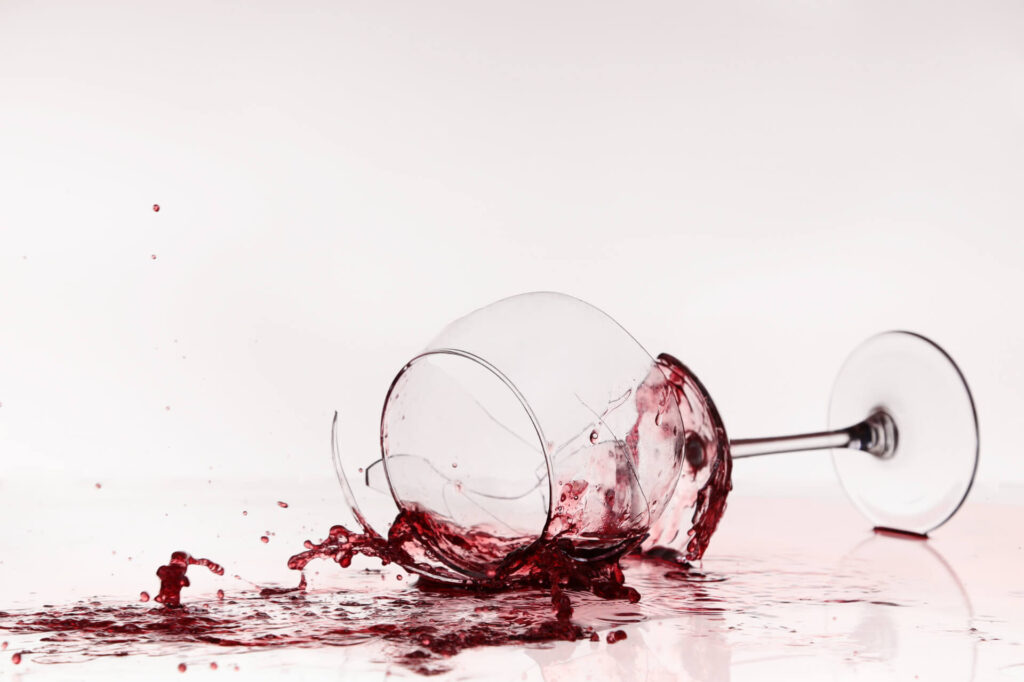There Is No Such Thing as An AlcoholicBy Michaela Weaver

There are many terms used in relation to alcohol that for most drinkers are unhelpful and damaging.
The most significant is the word ‘alcoholic’. The word alcoholic labels a person, and once labelled, they carry it for life. The word alcoholic (even high functioning ones), conjures up an image of somebody who has hit rock bottom, or is homeless and lost everything and continues to drink on a continuous basis and is on the verge of death. This label is unhelpful and inaccurate. It’s unhelpful because it is the only question that drinkers use as a yardstick for whether they have a problem that they need to address. It goes something like this …
‘No.’
‘That’s okay then.’
There is no room in that definition for any of the problem drinkers I’ve ever met and ever known.
Is an alcohol problem a disease?
You may have heard that alcoholism is a disease and that it is a disease for which there is no cure. That is a very worrying and inaccurate definition. It’s worrying because the very existence of the definition is stopping millions of people realising that they do have an alcohol problem, and that they are addicted to alcohol.
And what about the issue of it being an incurable disease? Our human brain is highly adaptive, and we unlearn and learn new things all the time.
Alcohol is a con artist.
Once the con trick that is alcohol is unravelled, our subconscious mind would have learnt new ways of thinking about alcohol. It is in these new ways of thinking that lies freedom, and these new ways of thinking are in no way connected to any kind of incurable disease.
When I was concerned about my drinking, I went to my local physician and asked her if she thought I was an alcoholic. She asked me many questions including:
‘Do I drink first thing in the morning?’ to which I said, ‘No,’ and her conclusion was that it was up to me to decide if I was an alcoholic or not.
It wasn’t the doctor’s fault that she was trying to diagnose a disease that could not be diagnosed. There is no blood test, there is no brain scan, there is no X-ray that can diagnose alcoholism. In fact, there is no test at all.
The problem with the terms alcoholic and alcoholism is that millions of capable, successful people who are suffering from alcohol addiction will continue to suffer until it is recognised that there is a pandemic of people who are addicted to alcohol.
It’s ironic that some schools of thought purport to the fact that alcoholism is incurable, and people are kept in purgatory for the rest of their lives trying to resist, and fearing what will happen to them if they don’t resist alcohol. If it were incurable, then people would not be escaping the trap using the method that I am giving you here in this book.
People are walking away from the trap without looking back with no need for willpower, with no mental torture, and no desire to ever drink again. That is not a criterion of any incurable disease. Because if it were then it starts to sound like witchcraft or magic which it most certainly is not.
The problem with addiction is largely psychological. The problem with addiction lies in the subconscious mind, and the way out lies in working with the subconscious mind.
In addition to getting in touch with AA and going to see my doctor I also went to see a counsellor to ask about my drinking patterns, and whether or not I might be an alcoholic. The counsellor started asking me a series of questions one of which also included the ‘Do you drink first thing in the morning?’ question. When I said no, she said I wasn’t an alcoholic and she started to explore with me the reasons why I drank alcohol.
Most of us have some issues related to our pasts, whether minor or major, and rooting around you are bound to find something.
We may be anxious socially, or we may feel that we can’t lose weight when we should be able to, or we may have issues forming deep relationships, or issues over going outside, or being indoors, or any number of a million different things that affect all of us to a certain extent. A counsellor will focus on these issues as a reason for somebody drinking, but they are completely misunderstanding the whole process of addiction. It is almost as though counsellors don’t realise alcohol is an addictive substance, so by asking ‘Why am I drinking?’ ‘What are the underpinning reasons for my drinking?’ is irrelevant.
I was addicted to alcohol.

The reason that I drank alcohol is the same reason that all drinkers drink alcohol, and that is to get the alcohol. I drank because I was addicted to alcohol.
That may have been beautifully packaged in subconscious phrases that told me it was relaxing me, or I needed it because I was stressed, or I was feeling in a really good mood so I needed to celebrate, or I had an argument with my partner, or I was feeling really frustrated. But that’s what it was: it was well-packaged self-talk. The reason I drank was to get my fix of alcohol, which is exactly the same reason every drinker drinks.
The counsellor asked me about the reasons why I drink, the doctor asked me to decide myself if I had the disease called alcoholism, and John at the AA told me that he spent every single day of his life trying to avoid having a drink. After consulting three experts about a problem I was trying to find out if I had, I drew a complete blank.
It was therefore clear to me that neither the organisation that is deemed to be head of knowledge for alcohol, nor the medical profession, nor the counselling profession had anything to offer me. It was through my executive coaching work and science degree that I uncovered the solution by starting to ask a different set of questions.
The fact is that people drink because they are addicted to a drug; that drug is alcohol and it is highly addictive. That is the only reason people drink. People have trauma: some people suffer from anxiety and some people are thrill seekers. That does not mean that they will become addicted to alcohol, it just means that they need ways to manage their thoughts and emotions in healthy ways so that their needs are met.
When my mother was pregnant with me, she was told by her doctor that if she wanted a small baby that would be less painful to deliver, she should smoke because smoking will reduce the size of a baby at birth and will be less painful. This was genuine advice given out by doctors in those days, with the information that they had at the time. We now know that nicotine is a highly addictive drug and lung cancer caused by smoking accounts for more deaths than any other type of cancer.
Did you know that alcohol causes more deaths than illicit drugs.

Alcohol causes more deaths than all illicit drugs combined. Even with this knowledge the general public still tends to believe that alcohol is an acceptable form of relaxation. Science tells us something different.
Often when we think about alcohol treatment for the elite, luxury client, we think of rehab centres with lengthy residences away from home to detox and have behaviour moulded anew. It is estimated that people go through rehab centres up to 7 times before they eventually comply with sobriety. Surely there has to be a better way. I have had clients come to me who have been traumatised by high end rehab centres where people with a host of alcohol and drug problems come together.
I work exclusively and discretely with women only, and more than that, my clientele are high achieving, successful women between the ages of 45 and 70: women who are in middle age and who want more for themselves. They want power, not sheep dip rehab programmes. They want authenticity, not lifelong recovery and labels.
Some drinkers fear that alcohol addiction is genetic or hereditary. Sixty years ago, 80% of British men smoked cigarettes and in 2020 that figure was 16%. If addiction is genetic that means that entire genetic makeup of a nation has changed in just 60 years. Isn’t it more likely that through education, awareness and changing beliefs that less people are becoming addicted to nicotine because less people are getting involved with the drug in the first place, and that more people have escaped the nicotine smoking trap?
People would generally agree that there are either smokers or non-smokers, and that anybody who smokes, regardless of how much, is a smoker. They are addicted to nicotine and they are a smoker. There is no term for somebody who smokes 60 or 80 cigarettes a day compared to ten, and they certainly wouldn’t be told that they are smokeaholics suffering from a lifelong disease called smokeaholism, for which there is no cure.
Most people know of somebody who has stopped smoking and is happily a non-smoker. If you know other people who have stopped using the willpower method then you will be experiencing them caught in the insufferable position of always wanting something that they can’t have.
I found myself in a family situation recently where I declined an alcoholic drink and ordered something non-alcoholic. One of my family members smiled and asked me if I wasn’t drinking because I was an alcoholic. I resisted the temptation to laugh out loud and swallowed a smile to myself as I looked at the absolute irony of the situation.
If I had declined a shot of heroin do you think I would have been asked if I was a heroin addict because it wasn’t something I wanted, or if I refused a cigarette would I be asked if I was a nicotine addict because I refused a cigarette? No, I wouldn’t.
Alcohol is the only drug that you have to justify not taking, and it’s the only drug that people will think you’re addicted to if you’re not consuming it. It’s the people who take it who are addicted, or the people who struggle not to want it. When you don’t want an addictive drug, you are free.
People still believe that someone who has stopped drinking is an alcoholic, and that they will continue to be alcoholics until the day they die, struggling in recovery.
When you understand the truth there is absolutely nothing to recover from other than getting your whole self back in alignment and becoming fulfilled in ways that you currently cannot imagine.
If there are smokers and non-smokers, then there are drinkers and non-drinkers.
The solution to alcohol addiction, although multifaceted, is really very simple for the vast majority: open your mind, explore the evidence, challenge your beliefs of the benefits, learn some facts, gain some skills, and walk to freedom. This is what I teach at The Alcohol Coach.
The development of an addiction to alcohol can take many years or decades to go from occasional consumption to a serious problem, or it can happen over a series of months. There are many factors that affect the rapidity of the entry into the alcohol trap. It is often the more educated, successful and sociable people who drink more, drink faster, and sink most quickly into the trap.
People who are better educated tend to drink most heavily.
There are many reasons for this. People who are better educated tend to drink heavily at College or University and so the reward mechanisms and pathways and learning in the subconscious are well established at a relatively young age. This group of people also then tend to go on to get more high powered jobs, and high achievers are often encouraged to drink after work, and they are also likely to suffer from more stress-related conditions connected with work.
The work hard, play hard ethic is strong and so successful people often drink more.
The work hard, play hard ethic is strong and so successful people often drink a lot. Women, in particular, are falling into the alcohol trap in droves. When women pause or stop their careers to have children, they can quickly fall into the end-of-day stress-relieving category of problem drinkers.
Wine o’clock is anything but fine o’clock, and hundreds of thousands of women at home with children are drinking with the perceived benefits of giving them some kind of enjoyable freedom at the end of the day, or relaxing because they’ve had a hard day looking after the children. Once the addiction is established it tends to grow over time, with a sneaky glass at lunchtime, or a bottle while cooking the dinner, and then even when the children have left home, it carries on.
Better educated and successful people have a higher disposable income which means that when it comes to financing alcohol addiction there are no barriers, and expensive wines and the best gins find their way into the booze cupboard at home.
The amount of alcohol drunk is also influenced by childhood and the role modelling of parents, parents’ friends and the group and social life of a child when growing up. A child brought up in an environment where the parents are seen to have parties, to entertain, and where alcohol is free flowing, is likely to associate the perceived benefits with alcohol more strongly and from a younger age, which means that these people are likely to fall into the trap more quickly and more heavily than people who were brought up without these influences.
There is an interesting issue here around family influences. It was thought that there were addictive personalities and that alcohol consumption was somehow genetic. The reasons are much more likely due to the subconscious learning of the child growing up in a household where she learns from the role modelling of her parents that this is what is expected.
The addictive personality idea is also reinforced by the fact that people who take one drug will take another. In reality, people who take drugs tend to stick together, so smokers will stick together with smokers, and they are also likely to drink as well. It is very rare that you will find people who don’t drink who smoke, it is more normal that people started smoking and then drinking was part of that process.
When people drink, their inhibitions are lowered and their control centre is diminished which means that they are likely to smoke a lot more when they are drunk, and even if they rarely smoke, they may find themselves smoking when they are drunk.
Using the idea of an addictive personality is a form of denial, and an excuse for not taking responsibility for the problem.
Are you ready to ditch the con artist?
There has been a link discovered between addiction and people who suffer from anxiety, and also people who seek excitement, and these dispositions may be genetic. But there are many more productive and healthy ways to address anxiety and live a life that is more exciting than hurling headlong into a bottle of oblivion. The more alcohol we drink, the less resilient we become and the less fun our lives are. Once away from the con artist we can start to build resilience and coping mechanisms and thrive in new and exciting ways. Are you ready for a free, powerful, and limitless life with zero labels? Book a call.

Hi, I'm Michela
I’m a leader in the science of transformational freedom for women, and someone previously addicted to alcohol. I have walked the path. I understand your concerns and fears. Here you will find some of my thoughts and insights. Happy browsing!
Keep me in the loop!
Want more inspiration, knowledge and ideas about alcohol and how to make the changes you want stick? Sign up here to receive more articles and news like this.